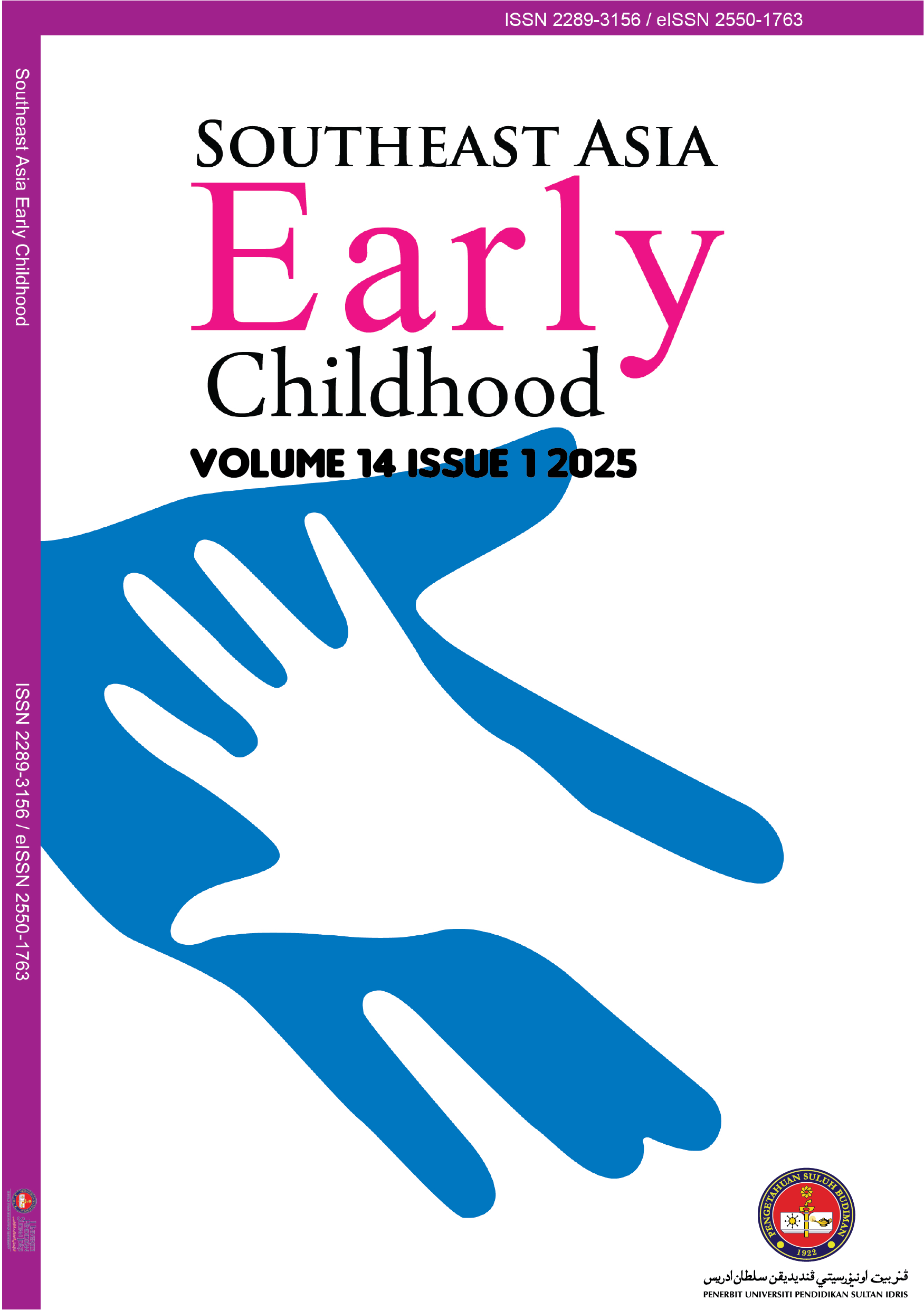Early childhood pre-service teachers’ adversity quotient and academic performance
DOI:
https://doi.org/10.37134/saecj.vol14.1.1.2025Keywords:
adversity quotient, academic performance, Early Childhood Education, Pre-service TeachersAbstract
There is a growing number of studies which delved into the relationship of Adversity Quotient (AQ) and academic performance of students. To add to the growing body of literature on this field, this study aims to determine Early Childhood Education pre-service teachers’ AQ and its relation to their academic performance. One hundred twenty-five (125) second- and third-year BECEd students participated in the study. Descriptive correlational-survey design was implemented. The revised Adversity Response Profile (ARP) was utilized to gather data. Mean and Standard Deviation were used to determine the AQ and academic performance of students, Pearson product-moment correlation was used to determine the relationship between AQ and students’ academic performance, and content analysis were used to analyze students’ answer to the open-ended question. The findings show that BECEd pre-service teachers obtained an average score of 135 (SD = 14.4) which is interpreted as Moderate AQ. In terms of their academic performance, students obtained a grade point average of 1.5 (SD = 0.190) which is interpreted as Very Good. In addition, the result of the study reveals that there is no significant relationship between participants’ AQ and academic performance, r (123) = -0.02, p = 0.831. Further, there is no significant relationship in any of the four dimensions (control, ownership, reach, endurance) of AQ and their academic performance. Since the study reveals that the pre-service teachers have moderate AQ in which the majority of individuals fall on this range, it is recommended that a student-development program be created and implemented to strengthen BECEd students’ AQ.
Downloads
References
Anik, B. U., & Lydia F. H. (2006). Kontribusi adversity quotient terhadap prestasi belajar siswa SMU program percepatan belajar di Jakarta. Jurnal Penelitian Psikologi, 11(2), 137-148.
Aprilia, E. D. (2018). Adversity quotient of late adolescence: A lesson to build survival skill from early life. Proceedings of the International Conference on the Roles of Parents in Shaping Children’s Characters (ICECED), December 3-4, 2018, Anjong Mon Mata, Banda Aceh, Indonesia.
Arstity, H. (2012). Hubungan antara adversity quotient dan kematangan karir dengan prestasi akademik mahasiswa Fakultas Psikologi Universitas Muhammadiyah Surakarta (Bachelor thesis, Universitas Muhammadiyah Surakarta, Jawa Tengah, Indonesia). Retrieved from http://etd.eprints.ums.ac.id/18331/
Bakare, B. M. (2013). Student’s Adversity Quotient and Related Factors as Predictors of Academic Performance in the West African Senior School Certificate Examination in South- Western Nigeria. Retrieved from http://www.peakle arning.com/documents/PEAK_GRI_bakare.pdf
Cura, J. M., & Gozum, J. L. (2011). A correlational study in the Adversity Quotient® and the mathematics achievement of sophomore students of College of Engineering and Technology in Pamantasan ng Lungsod ng Maynila (Bachelor thesis, University of the City of Manila, Manila, Philippines). Retrieved from http://www.peaklearning.com/documents/PEAK_GRI_gozum.pdf
Devakumar, M. (2012). A Study of Adversity Quotient of Secondary School Students in Relation to their Academic Self Concept and Achievement Motivation. Doctorate Thesis, University of Mumbai.
Effendi, M., Rahman, N., Idris, H., Khairani, A., Hapiz, N. (2020). Is adversity quotient (AQ) able to predict the academic performance of polytechnic students? Journal of Critical Reviews. 7(3) 393-398
Gall, M.D., Gall, J.P., Borg, W.R. (2007), Educational research: An introduction (8th ed.). Boston: Pearson. Retrieved from https://journals.sagepub.com/doi/full/10.1177/1362168815572747
HuiJuan, Z. (2009). The adversity quotient and academic performance among college students at St. Joseph’s College, Quezon City (Bachelor thesis, St. Joseph’s College, New York, United States). Retrieved from http://www.peaklearning.com /documents/PEAK_GRI_huijuan.pdf
Indah, A. L. (2010). Effects of learning motivation, learning interest, and adversity quotient accounting students on academic achievement (Case study Prodi S1 Accounting Faculty of Economics in one private universities in Jakarta (Master’s thesis, Universiti Gunadarma, Depok, Indonesia). Retrieved from http://papers. gunadarma.ac.id/index.php/economy/article/view/686
Khairani Ahmad Zamri and Syed Mohammad Syed Abdullah, 2018. Relationship Between Adversity Quotient and Academic Well-being among Malaysian Undergraduates. Asian Journal of Scientific Research, 11: 51-55.
Kuhon, F. (2020). A study on students’ adversity quotient and academic performance in English subject. Journal of Advanced English Studies. Vol.3, No. 1.
Laguador, J.M., Pesigan, M. (2013). Academic performance and measure of character and personality of engineering students with and without referral from counselling center. Asian Academic Research Journal of Social Science & Humanities, 1(16): 281-293.
Matore, M., Khairani, A., Razak, N. (2015). The Influence of AQ on the Academic Achievement among Malaysian Polytechnic Students. International Education Studies. 8(6) 69-74 doi:10.5539/ies.v8n6p69
McCombes, S. (2020). Descriptive research. Retrieved from https://www.scribbr.com/methodology/descriptive-research/
Phoolka, S. & Kaur, N. (2012). Adversity Quotient: A new paradigm to explore. International Journal of Contemporary Business Studies, 3(4), 67-78.
Pokhrel, S. & Chhetri, R. (2021). A Literature Review on Impact of COVID-19 Pandemic on Teaching and Learning. Higher Education for the Future, v8 n1 p133-141. Retrieve from https://eric.ed.gov/?id=EJ1284760
Priska, W. H. (2010). Adversity Quotient dan prestasi akademik pada anggota peleton inti siswa SMA (Bachelor thesis, Universitas Islam Indonesia, Yogyakarta, Indonesia). Retrieved from http://rac.uii.ac.id/harvester/index.php/record/view/ 61561
Siregar, S. (2019). Adversity Quotient – Book summary. Slideshare. Retrieved from https://www.slideshare.net/StephenSiregar/adversity-quotientbook-summary
Sia, T. (2001). Hubungan antara IQ, EQ, dan AQ dengan prestasi studi pada siswa SMU. Anima Indonesian Psychological Journal, 17(1), 69-92.
Stoltz, Paul G. (1997) Adversity Quotient: Turning obstacles into opportunities. Canada: John Willey and Sons, Inc.
Stoltz, P. G., & Weihenmayer, E. (2010). The adversity advantage: Turning everyday struggles into everyday greatness (2nd ed.). New York: Fireside.
Vinas, D. K. & Malabanan, M. G. (2015). Adversity quotient and coping strategies of college students in Lyceum of the Philippines University. Asia Pacific Journal of Education, Arts and Sciences. Vol. 2 No. 3.
Yazon, A. (2019). Pre-service Teachers’ Adversity Quotient and Proficiency in English Language and Mathematics.
Downloads
Published
Issue
Section
License
Copyright (c) 2025 Melissa Tiglao Bartolome, April Ann Curugan, Wilson Cordova

This work is licensed under a Creative Commons Attribution-NonCommercial-ShareAlike 4.0 International License.





